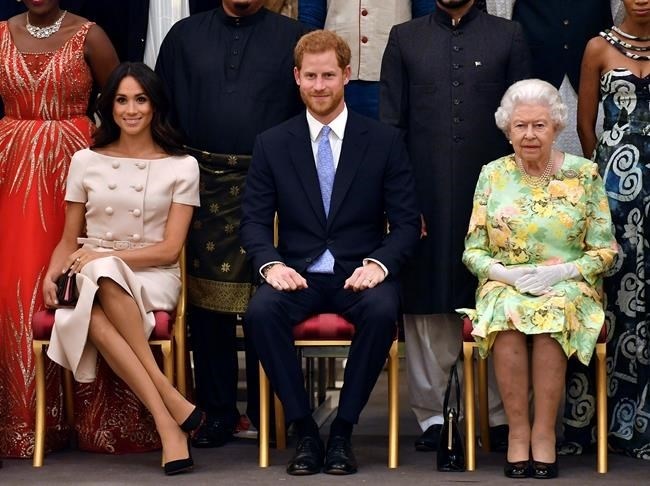
Britain's Queen Elizabeth, Prince Harry and Meghan, Duchess of Sussex pose for a group photo at the Queen's Young Leaders Awards Ceremony at Buckingham Palace in London on Tuesday, June 26, 2018. A journalism expert says Prince Harry and Meghan may have been drawn to Canada's "deferential" media culture as they mulled their part-time move across the pond.
Image Credit: THE CANADIAN PRESS/AP, John Stillwell/Pool Photo
January 14, 2020 - 7:00 PM
Jeffrey Dvorkin remembers returning home to the Annex in downtown Toronto to find his quiet neighbourhood transformed by a swarm of paparazzi, reporters, police and security. At the centre of the pandemonium was none other than Prince Harry, who at the time, was courting the "Suits" actress then known as Meghan Markle.
Since then, the press has proved to be an unwelcome third wheel in the couple's relationship. And after years of mounting tensions, the Duke and Duchess of Sussex have decided to shirk their senior royal duties, including their traditional media obligations.
As the Sussexes prepare for a part-time move across the pond, Dvorkin, the director of the journalism program at the University of Toronto's Scarborough campus, suspects they'll find Canada's media environment much more hospitable than back home.
While the British tabloids are locked in a cutthroat competition to hunt down sensational headlines, Canada's media oligopoly favours a less aggressive approach to covering high-profile subjects, said Dvorkin.
"We still have a strong colonial mentality in this country that occasionally leaches into the journalistic culture, which is about being respectful and knowing one's place," he said.
"It'll be a challenge for Canadian journalism to find the right tone, without being seen to be overly deferential and overly Canadian polite, as we tend to be."
There's a long history of bitter relations between Fleet Street — London's historical journalistic hub — and Buckingham Palace, said Dvorkin. But until recently, the rule was that the monarchy "never bites back."
From the first official statement by Kensington Palace confirming their coupling in 2016, it was clear that Harry and Meghan would take a different tack in calling out what they deemed to be "a wave of abuse and harassment" directed at the biracial Markle, including commentary with "racial undertones."
Dvorkin said racism has always lurked beneath the veneer of British civility, but has come to the fore in recent years as Brexit unleashed a swell of nationalist sentiment that branded Meghan as "not one of us."
He said the prince's mistrust of the media traces back to the untimely demise of his mother, Diana, who was killed in a car crash in 1997 while being pursued by photographers.
Last year, the young royals launched a lawsuit against the Mail on Sunday newspaper over its publication of a letter written by Meghan. Harry said he feared "history repeating itself... I lost my mother and now I watch my wife falling victim to the same powerful forces.''
Hostilities came to a head earlier this month, when as part of their reduced role within the monarchy, the Sussexes announced they would opt out of the "royal rota" system, which grants a handful of U.K. outlets special access to the House of Windsor.
Professing their commitment to a "strong and open media industry," the couple said they would work with "grassroots" media outlets and "up-and-coming journalists."
The move was met with outrage by the British press. In a statement, the general secretary of the National Union of Journalists accused the Sussexes of attempting to interfere with journalists' abilities to do their jobs, adding that reporters should not need a "royal seal of approval" to cover an institution funded by the public purse.
While Dvorkin agreed that public officials shouldn't be able to handpick who covers them, he described the royal relationship with the media as "antiquated."
He said Harry and Meghan might find Canadian journalists to be a breath of fresh air in their circumspection, noting that the family spent the holidays on Vancouver Island with next to no public photos surfacing.
David Fraser, a privacy lawyer at McInnes Cooper, said the Canadian media's sense of decorum appears to be cultural rather than written into the letter of the law.
Fraser said public figures in Canada have similar legal protections against intrusions of privacy as those in the U.K., but there also haven't been as many cases of celebrities suing the press to test those boundaries.
"We haven't developed in Canada a press that's based on popularity and celebrity and royal obsession," said Fraser. "But who knows if we get members of the royal family living here six months a year?"
Given the high price tag of celebrity images, Fraser predicted that Canada could see an influx of paparazzi and tabloid writers who are more eager to push limits, which could lead to a rise in trespassing charges against overzealous shutterbugs.
Dvorkin believes Canada's media landscape could benefit from the international competition.
"The Canadian media culture is so owned and operated by a few influential media organizations ... there's not a lot of room to try out really new ideas," he said.
"Meghan and Harry might be a boon to Canadian journalism, if Canadian journalism decides to report them in a more effective way."
This report by The Canadian Press was first published Jan. 14, 2020.
News from © The Canadian Press, 2020